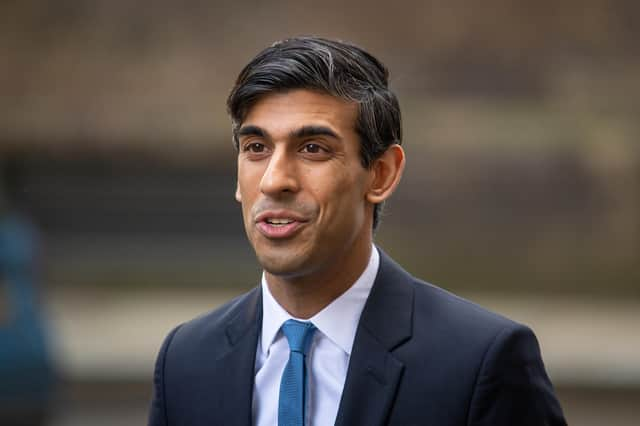Is Rishi Sunak the highest-spending Labour Chancellor the Conservatives have ever had? – Bill Jamieson


Even before his summer economic package this week, Rishi Sunak has already carved himself a unique place in the pantheon of UK chancellors – more memorable and distinctive than dozens of his predecessors.
Will it save us – or drive us further into penury and default as the bills flood in? Will it lift investment and growth? Or leave firms more apprehensive than ever over a future tsunami of tax increases and debt defaults?
Advertisement
Hide AdAdvertisement
Hide AdAnd here in Scotland, will the £4.6 billion in the total of Barnett consequentials of the government’s emergency measures boost support for the Union? Or feed the grievance culture and the desire of voters for a clean break with a deeply troubled past?
Alarm bells should be ringing loudly at all of this. But no verdict can be attempted until we know whether this extraordinary series of emergency spending measures will work to avoid unemployment hitting three million – and what the legacy consequences will be in terms of future tax increases and debt reduction measures.
But for now, the money released by the chancellorship of Rishi Sunak is epic. Barely known at the start of the year, his first budget in March was swamped by subsequent emergency support packages and measures.
In less than five months, his arrival at Number 11 has smashed through previous Treasury constraints on what government can and cannot undertake to support the economy.
Before his latest measures today, UK Government debt was already soaring towards 100 per cent of GDP, and the annual budget deficit careering towards £300 billion. In the modern history of the Treasury, such figures look fantastical.
Now come yet more crisis measures and additional spending running to tens of billions of pounds. The measures range from a £9 billion increase by way of a job retention bonus and a £3 billion ‘green jobs’ package to a £2 billion job ‘kick-start’ scheme, confirmation of a massive infrastructure spending, commitment to a temporary Stamp Duty cut, a slashing of VAT from 20 per cent to five per cent for the hospitality sector, and 50 per cent meal discount vouchers in August to encourage custom at pubs, hotels and restaurants. Eat for Britain!
This astonishing spending splurge not only smashes the long-standing tradition of Chancellors acting as Dr No to administrations of the Left and Right. It establishes a precedent-setting new high-tide mark for peacetime government spending. Little wonder this chancellorship could rank among the most transformative we have ever had. And that it has catapulted Mr Sunak to a level of popularity that has placed him as the frontrunner in any future Conservative leadership contest.
But how will we judge such measures as a ‘success’? ‘Jobs, jobs, jobs’ was the unwritten refrain of this latest package Such is the apprehension over the phasing out of the Job Retention Scheme in October that independent forecasts of unemployment range up to 10.5 per cent, equivalent to 3.6 million people compared with 1.34 million in the latest official figures. Now success will be hailed if he can keep this baleful total to below three million.
Advertisement
Hide AdAdvertisement
Hide AdAs for economic recovery, the Treasury’s latest monthly compilation of economic forecasts suggests an average expectation that GDP will drop by 9.1 per cent this year. But even this would be judged a ‘result’ when compared to earlier Office for Budget Responsibility and Bank of England forecasts. This would still be the worst since 1921 when the world was reeling from the Spanish flu pandemic and GDP fell by an estimated 9.7 per cent.
Would any other Chancellor have responded differently? As it is, he now stands accused of being the highest-spending Labour Chancellor the Conservatives have ever had. And any measures less extraordinary than those announced by Mr Sunak would risk being attacked as woefully inadequate. The devastating coronavirus has driven not just the UK but every other afflicted economy to adopt emergency measures. The Chancellor may have a fluent and persuasive style that has bestowed a charisma on his performance. But these emergency measures have been forced upon him by the steepest economic decline in living memory.
And judgement must await the formal budget in October when the second shoe will fall. This is when he will present a fresh set of forecasts on unemployment, economic growth and the Government’s debt and deficit trajectory as well as measures to bring these back into levels that look more manageable than they currently do. These could range over a wealth tax and the introduction of a sales tax to replace business rates.
But in this, he treads another tightrope: avoiding a new austerity era that could hit a fragile recovery next year. Mr Rishi Sunak is not near the beginning of the end – only the end of the beginning of this extraordinary chancellorship.
A message from the Editor:
Thank you for reading this article on our website. While I have your attention, I also have an important request to make of you.
With the coronavirus lockdown having a major impact on many of our advertisers - and consequently the revenue we receive - we are more reliant than ever on you taking out a digital subscription.
Subscribe to scotsman.com and enjoy unlimited access to Scottish news and information online and on our app. With a digital subscription, you can read more than 5 articles, see fewer ads, enjoy faster load times, and get access to exclusive newsletters and content. Visit www.scotsman.com/subscriptions now to sign up.
Our journalism costs money and we rely on advertising, print and digital revenues to help to support them. By supporting us, we are able to support you in providing trusted, fact-checked content for this website.
Joy Yates
Editorial Director
Comments
Want to join the conversation? Please or to comment on this article.